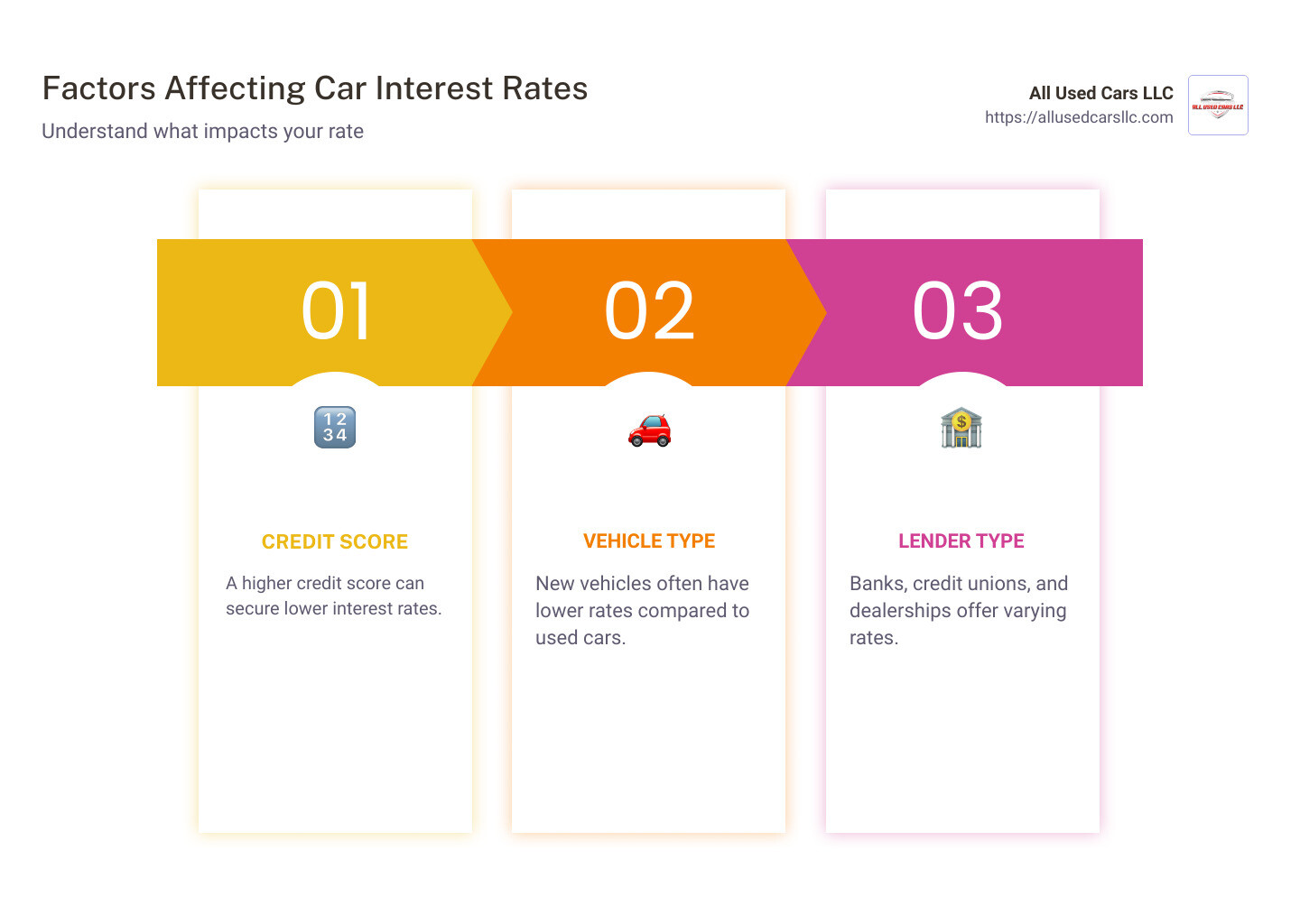
Car Interest Rates: Top 5 Secrets to Secure the Best
Car interest rates can seem complex, but understanding them is crucial for any budget-conscious car buyer. Let’s break it down so you know what to expect. Whether you’re considering an auto loan for a used or new vehicle, your interest rate largely depends on several key factors:
- Your Credit Score: The better your score, the lower your rate.
- Type of Vehicle: New cars typically have lower rates than used ones.
- Lender Type: Banks, credit unions, and dealerships may offer different rates.
- Loan Term: Shorter terms often mean lower interest.
Auto loans and their interest rates are pivotal in determining your overall vehicle expense. Navigating these waters can be easier with the right knowledge, helping you secure the best possible deal. Auto loans can be simplified by comparing various financing options and understanding how interest rates work. This way, you can choose a path that aligns with your financial goals and needs.
So, as you search for your next reliable used vehicle, keep in mind the significance of finding affordable financing options. Knowing your options empowers you to negotiate better terms and save on your purchase.
Car interest rates terms to learn:
Understanding Car Interest Rates
Car interest rates can feel like a maze, but understanding them is key to making smart financial decisions when buying a car. Let’s simplify the important aspects you need to know.
Interest Rates
Interest rates are the cost of borrowing money. They are expressed as a percentage of the loan amount. The rate you get can significantly impact your monthly payments and the total cost of your car.
- New Cars vs. Used Cars: New cars often come with lower interest rates compared to used cars. According to Experian, the average interest rate for new cars was 6.61%, while it was 11.74% for used cars in the third quarter of 2024.
- Credit Score Matters: Your credit score is one of the biggest factors in determining your interest rate. People with higher scores, like those in the “superprime” category (781-850), receive better rates. For example, they might see an average APR of 5.08% for new cars. In contrast, those with deep subprime scores (300-500) could face rates as high as 15.43%.
Loan Terms
Loan terms refer to the length of time you have to repay the loan. They can range from 36 months to 96 months or more. The term you choose affects your interest rate and monthly payment.
- Shorter Terms: A shorter loan term usually means a higher monthly payment but less interest paid over time. For instance, a 36-month term might have a lower interest rate than a 72-month term.
- Longer Terms: These often come with lower monthly payments but can result in paying more interest in the long run. Be cautious of extending the loan term too much just to lower the payment.
Credit Score
Your credit score is like your financial report card. It tells lenders how risky it is to lend you money. A higher score means you’re seen as a lower risk, which usually leads to better interest rates.
- Improving Your Score: Before applying for a loan, check your credit score. If it’s not where you want it to be, take steps to improve it. Simple actions like paying bills on time and reducing debt can help boost your score.
- Pre-Approval Benefits: Getting pre-approved for an auto loan can give you an idea of the interest rate you might qualify for, without affecting your credit score. This can also give you leverage when negotiating with dealers.
Understanding car interest rates is crucial to making informed decisions when financing a car. By knowing the factors that affect rates, you can better steer the car-buying process and find the best deal for your situation.
In the next section, we’ll explore the various factors that influence car loan interest rates, including credit history, loan amount, and vehicle age.
Factors Influencing Car Loan Interest Rates
When it comes to car interest rates, several key factors come into play. Understanding these can help you secure the best possible rate for your car loan.
Credit History
Your credit history is a record of your past borrowing and repayments. It’s a major factor that lenders consider when deciding your interest rate.
- Good Credit: If you have a strong credit history with on-time payments and low debt, you’re likely to receive a lower interest rate. This is because lenders see you as a lower risk.
- Poor Credit: Conversely, a history of missed payments or high debt can lead to higher interest rates. Lenders charge more to offset the risk of lending to someone with a less reliable credit history.
Loan Amount
The amount you borrow can also influence your interest rate.
- Smaller Loans: They might come with higher rates because lenders want to ensure they make a profit on smaller amounts.
- Larger Loans: These can sometimes qualify for lower rates, especially if the borrower has good credit. However, it’s important not to borrow more than you need, as this increases the total interest paid over time.
Vehicle Age
The age of the car you’re buying affects the interest rate.
- New Cars: Typically come with lower interest rates. They’re seen as less risky because they have a higher resale value and are less likely to need repairs soon after purchase.
- Used Cars: Often have higher interest rates. According to Experian, used car interest rates averaged 11.74% in late 2024. This is because used cars have a lower resale value and might require more maintenance.
Loan Term
The length of your loan term can significantly impact your interest rate.
- Shorter Terms: Usually offer lower interest rates. You’ll pay off the loan faster, reducing the lender’s risk.
- Longer Terms: Often come with higher rates. While they lower your monthly payment, they increase the total interest paid. Be cautious, as extending the term too much can lead to paying more in interest than the car is worth.
Understanding these factors can help you steer the car loan process more effectively. By focusing on improving your credit history, choosing the right loan amount, considering the age of the vehicle, and selecting an appropriate loan term, you can secure a more favorable interest rate.
In the next section, we’ll compare new vs. used car loan rates and explore the benefits and drawbacks of dealership financing versus direct lending.
Comparing New vs. Used Car Loan Rates
When deciding between a new or used car, understanding the differences in loan rates is crucial. New car rates and used car rates can vary significantly, impacting your overall cost.
New Car Rates
New cars often come with lower interest rates. Lenders see them as less risky because they have a higher resale value and are less prone to immediate repairs. According to Experian, the average interest rate for new cars was 6.61% in late 2024. This is significantly lower than the rates for used cars, making new cars more attractive for financing.
Used Car Rates
Used car loans generally have higher interest rates. Experian reported an average rate of 11.74% for used cars in the same period. This is because used cars depreciate faster and may have more maintenance issues. However, the lower purchase price of a used car can offset the higher interest rate, potentially making it a more affordable option overall.
Dealership Financing
Dealerships often offer convenient financing options. They may provide promotional rates or special financing deals, especially on new cars. However, these rates can sometimes be higher than those offered by banks or credit unions. It’s essential to read the fine print and ensure there are no hidden fees.
Direct Lending
Direct lending involves securing a loan from a bank or credit union before visiting the dealership. This method often offers more competitive rates, especially for used cars. By getting pre-approved, you can negotiate more effectively with the dealership and avoid high-pressure sales tactics.
Key Takeaways:
- New Cars: Lower interest rates but higher initial cost.
- Used Cars: Higher interest rates but potentially lower overall cost.
- Dealership Financing: Convenient but may include higher rates or fees.
- Direct Lending: Potentially lower rates and more negotiating power.
When choosing between new and used car loans, consider your budget, credit score, and financial goals. In the next section, we’ll explore strategies to secure the best car interest rates, including pre-approval and credit score improvement.
How to Secure the Best Car Interest Rates
Securing the best car interest rates is crucial for minimizing the total cost of your auto loan. Here’s how you can do it:
Pre-Approval
Getting pre-approved for a loan can give you an edge. It not only provides clarity on how much you can afford but also gives you leverage in negotiations with dealerships. Pre-approval often involves a hard credit check, so it’s best to apply when you’re ready to make a decision quickly. This step can help you understand potential interest rates and set a realistic budget.
Credit Score Improvement
Your credit score plays a significant role in determining your interest rate. A higher score typically results in lower rates. Here are some ways to improve your credit score:
- Pay bills on time: Late payments can negatively impact your score.
- Reduce debt: Lowering your debt-to-income ratio can boost your credit.
- Check your credit report: Look for errors and dispute any inaccuracies.
Rate Shopping
Shopping around for the best rates is essential. Different lenders offer different rates, and even a small difference can save you a lot of money over the life of the loan. Use the rate-shopping window wisely. Credit scoring companies like TransUnion allow a 14-day period where multiple credit inquiries count as one. This can minimize the impact on your credit score while you compare offers.
Down Payment
Making a substantial down payment can reduce your loan amount and, consequently, your interest rate. Experts recommend at least 20% for new cars and 10% for used cars. A larger down payment decreases the lender’s risk, potentially leading to better rates and lower monthly payments.
Quick Tips:
- Pre-Approval: Provides clarity and negotiation power.
- Credit Score: Higher scores lead to better rates.
- Rate Shopping: Use the grace period to minimize credit score impact.
- Down Payment: Larger down payments can reduce your interest rate.
By following these strategies, you can secure the best possible interest rates on your car loan. In the next section, we’ll address common questions about car interest rates, including what constitutes a good APR for a 72-month loan.
Frequently Asked Questions about Car Interest Rates
What is a good APR for a 72-month car loan?
When considering a 72-month car loan, understanding the Annual Percentage Rate (APR) is crucial. A good APR varies based on your credit score. According to Experian, for someone with a superprime credit score (781-850), the average new car loan APR is about 5.08%. For a subprime score (501-600), it jumps to 13.00%.
Longer loan terms like 72 months often come with higher APRs. While they offer lower monthly payments, the total interest paid over time can be significantly more.
How do car interest rates work?
Car interest rates determine how much extra you pay to borrow money for a car. Lenders usually use simple interest to calculate this. This means interest is calculated on the remaining balance of your loan each month.
Here’s how it works:
- Interest Calculation: Each month, a portion of your payment goes toward interest and the rest toward the principal.
- Simple Interest: More interest is paid at the beginning of the loan, with more principal paid off as time goes on.
- Monthly Payments: Your monthly payment stays the same, but the ratio of interest to principal changes.
Using a car loan calculator can help you understand how different rates and terms affect your monthly payments.
Can shopping for car loans affect my credit score?
Yes, shopping for car loans can impact your credit score, but there are ways to minimize this effect. When you apply for a loan, lenders perform a hard credit check, which can temporarily lower your score.
However, using a rate-shopping window can help. Credit agencies like TransUnion allow multiple inquiries to count as one if they occur within 14 days. This lets you compare different offers without drastically affecting your score.
Key Points to Remember:
- APR: Varies with credit score; longer terms usually mean higher rates.
- Interest Rates: Calculated as simple interest, affecting monthly payments.
- Credit Score Impact: Minimized by using the rate-shopping window effectively.
Understanding these aspects can help you make informed decisions when financing your vehicle.
Conclusion
Navigating car loans can be daunting, but understanding car interest rates is key to making informed decisions. At All Used Cars LLC, we aim to simplify this process for you.
Our extensive dealer network across the USA provides access to a wide selection of top-quality used vehicles at competitive prices. Whether you’re in Alabama, California, New York, or Texas, our team is dedicated to helping you find the best financing options custom to your needs.
We pride ourselves on transparency and customer service. Our experts are here to guide you through the loan application process, ensuring you secure the most favorable rates possible.
For those considering a car loan, factors like your credit score, loan term, and vehicle age can influence the interest rates you receive. By shopping around, improving your credit score, and considering a larger down payment, you can potentially lower your costs.
Choosing All Used Cars LLC means choosing a partner committed to your financial well-being. Explore our used cars for sale and start your journey towards affordable car ownership today.





